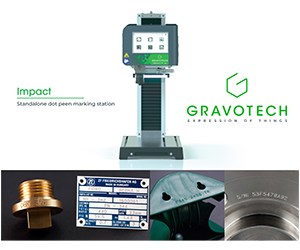EDM Part Precision Imperative To Racecar Manufacturer
To meet a challenge that requires precision machining capability, Joe Gibbs Racing ordered two EDM machines and has been successful in machining the smallest of parts ever since.
At Joe Gibbs Racing (Huntersville, North Carolina), where NASCAR Nextel Cup and Bush Series stock cars are born—and where Mitsubishi EDM machines now play a crucial role—quality is essential. Parts must be right the first time; one minor failure can put a car out of a race, or even into a concrete wall.
This need for accuracy and precision is where Mitsubishi EDM (Wood Dale, Illinois) comes into play.
Last year, Joe Gibbs Racing (JGR) was faced with a challenge that required precision machining capability. The final product had to be perfectly flat and without burrs, and the slots were too small to machine. "It was a perfect application for EDM," says Mark Bringle, manufacturing director of JGR.
"On everything we build, we are trying to make parts lighter but stronger to reduce weight on the car and make it faster," Mr. Bringle adds. "Many of these parts could be cast, but we've had porosity problems, so we're staying away from casting. EDM looked like the best way to go."
Mr. Bringle ordered an FA20 wire EDM and an EA12E ram EDM. "The two machines came in around Thanksgiving 2003," he recounts. "They've been running continuously, 24 hours a day, ever since, without missing a single beat. The need for the wire machine has been especially heavy. We've got eight to ten parts backed up on it right now."
Mr. Bringle will not go into much detail on most of the parts being machined by EDM at the shop for security reasons. But he says that many of the parts involve exotic materials, especially in cases where the parts have to be very light and very hard at the same time. The EDM machines are also invaluable when openings must be cut that are too small for conventional machining, where there are sharp internal edges or when edges must be precise and burr-free. Many times, the blank is turned on a lathe and the wire or ram EDM finishes the job. Most of the parts involve short runs—50 of one thing, 300 of another—so the operators are constantly changing setups.
"The most important contribution to our team is that these parts weren't converted to EDM from other processes," Mr. Bringle says. "We simply weren't making them before. The Mitsubishi EDM machines have let us move ahead and stay competitive with the other top teams in the Nextel Cup Series."
Flexibility has been another component added by using the Mitsubishi EDM machines. Mr. Bringle reported that during the week of January 26, 2004, a last-minute rule change arrived from NASCAR. The rule required fabrication changes on certain parts. "Normal turnaround for our outside suppliers is 6 to 8 days on jobs like these," he says. "Our trucks were leaving for the Daytona 500 on February 4. We didn't have 6 to 8 days. The only way we could get the job done was with our in-house equipment." The EDM machines proved it was possible to make the change successfully.
Mr. Bringle is pleased with theEDM machines' performance, and he says another Mitsubishi EDM wire machine is definitely on JGR's wish list. "The longer we have this one (the FA20), the more things we keep coming up with to use it for."
Read Next
3 Mistakes That Cause CNC Programs to Fail
Despite enhancements to manufacturing technology, there are still issues today that can cause programs to fail. These failures can cause lost time, scrapped parts, damaged machines and even injured operators.
Read MoreThe Cut Scene: The Finer Details of Large-Format Machining
Small details and features can have an outsized impact on large parts, such as Barbco’s collapsible utility drill head.
Read More








.png;maxWidth=300;quality=90)










